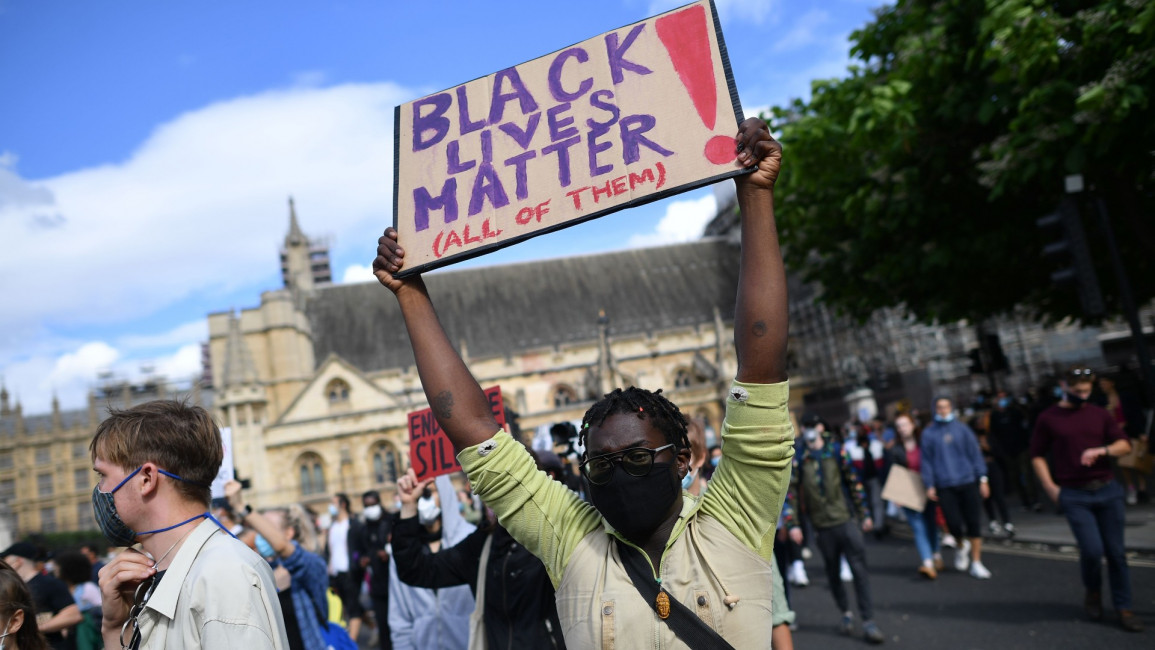
'Keep calm and carry on': Race and Ethnic Disparities Commission ignores Britain's racist reality
The Windrush scandal, a summer of Black Lives Matter protests, a year of disproportionate Covid-19 related deaths and infections among Global South communities - to name just a few - were apparently just random moments in recent British history that were in no way reflective of the reality of race and racism in the country.
The government report, led by Tony Sewell - a friend of Boris Johnson, and someone who has undermined the existence of institutional racism in the past - has concluded that the UK is a success story and "a model for other white-majority countries" when it comes to race related inequality in, for example, education.
The report's recommendation includes scrapping use of the term Black, Asian and Minority ethnic (BAME) in reference to people of colour. Apparently, this homogenises these communities, and overlooks their differences.
What is certainly telling, is that the focus of the report is not the structures that discriminate, exploit and criminalise people through perpetuated racist stereotyping and targeting, but rather, the use of an acronym.
Understandably some are celebrating the scrapping of this term given it is associated with a depoliticised, profit-driven, so-called diversity industry that has little interest in dismantling oppression. In fact, the institutionalising of BAME as a category ran parallel with the destruction of anti-racist and anti-fascist movements on the streets and in communities throughout the late 1970s and 1980s.
 |
These observations reinforce existing inequalities and reduce the problem to a dangerous, one-dimensional issue of heritage |  |
In fact, official "anti-racism" has policed dissent against state and street level hate, and individualised these forms of violence: We are taught to believe - in schools, media representations, and workplace "diversity trainings" - that the racism we experience is about personal interactions rather than the outcomes of structures and systems of power and exclusion.
This report, however, attempts to erase the realities of oppression in British society, and the fact that it was commissioned by Johnson and his party should make us think twice about the intentions of such a recommendation. This is not a victory or concession by any means. Instead, it signals that the victories of the past have now been fully rolled back, and that the state is moving on to a new phase in its assault on the most oppressed.
Twitter Post
|
Disbanding a category that provides a means to gather information about the situation of minority groups in the UK, but that in reality also provided the state with a helpful means of dividing to better control, is perhaps no bad thing.
In the case of education, for example, the report refers to children of Caribbean descent as not achieving as well, academically, as other minority groups. In turn, it points out that those other groups are on par with, and at times perform better than, their white counterparts.
Such observations reinforce existing inequalities and reduce the problem to a dangerous, one-dimensional issue of heritage. This actively obscures the historical treatment of that community at the hands of the British state - socially, economically and politically.
Read more: Kill the bill: Resisting a police state in the UK
We are duped into believing that the naming of different communities and experiences will lead to them being acknowledged, and to the development of bespoke solutions. Nothing could be further from the truth.
In reality, this is yet another attempt to divide different communities of colour, undermine any collectivising of struggles, and destroy ongoing efforts for liberation. While racism, xenophobia and fascism may be handed out differently to particular groups, the root cause remains the same: the state and the profit driven economic system which it defends.
It is also an exercise in pitting communities against each other. The state has long adopted the use of so-called "model minorities" to justify its political agendas. Just look at Boris Johnson's cabinet of ethnic diversity, of which several members have already mobilised their identity to undermine accusations of racism by the government.
The very person in charge of the commission is, after all, a woman of colour. Munira Mirza was the perfect candidate for the job. She has questioned the very existence of structural racism and is more than happy to provide cover for the PM's repeated demonstrations of his rabid racism - in writing and in speech.
 |
While racism, xenophobia and fascism may be handed out differently to particular groups, the root cause remains the same |  |
The right's manipulation of identity politics is likely to increase following the publication of this report. The more specific racialised groups can be identified as successful and upwardly mobile socio-economically, then those groups and individuals failing to do so can be accused of not working hard enough, studying well enough, or managing their resources intelligently enough.
Victims of racism should - by this logic - not get organised and fight back against state violence, exclusion, and exploitation. They should only blame themselves, and try harder.
Yet, history is often marked by striking ironies. The publication of the report stands in stark contrast with an action led by students against structural discrimination in their school in London.
 |
It is also an exercise in pitting communities against each other |  |
Pupils at Pimlico Academy secondary school in London walked out and went on strike over racism from their school's head. They protested the attempted banning of "colourful hijabs and afros", which they stated was discriminatory towards ethnic minorities, as well as the school's refusal to recognise Black History Month.
A list of demands related to all forms of oppression was released to the school authorities, and the students won!
This is not only a perfect illustration of the realities of racism in the UK, but it is also a concrete example of how we should approach this report: In the face of oppression, divide-and-rule tactics, and the sidelining of our demands, we need greater unity in struggle and resistance.
In the face of imposed narratives and individualised "solutions" to structural oppression, we should present our own, and fight for them until those in power have no other choice but to concede and retreat.
Malia Bouattia is an activist, a former president of the National Union of Students, and co-founder of the Students not Suspects/Educators not Informants Network.
Follow her on Twitter: @MaliaBouattia
Have questions or comments? Email us at: editorial-english@alaraby.co.uk
Opinions expressed here are the author's own, and do not necessarily reflect those of her employer, or of The New Arab and its editorial board or staff.




